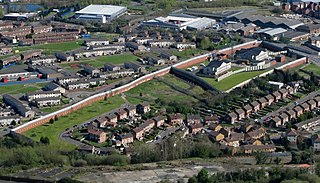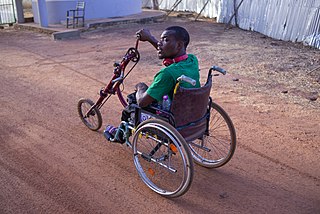Related Research Articles

Abortion in the United Kingdom is de facto available under the terms of the Abortion Act 1967 in Great Britain and the Abortion (No.2) Regulations 2020 in Northern Ireland. The procurement of an abortion remains a criminal offence in Great Britain under the Offences Against the Person Act 1861, although the Abortion Act provides a legal defence for both the pregnant woman and her doctor in certain cases. Although a number of abortions did take place before the 1967 Act, there have been around 10 million abortions in the United Kingdom. Around 200,000 abortions are carried out in England and Wales each year and just under 14,000 in Scotland; the most common reason cited under the ICD-10 classification system for around 98% of all abortions is "risk to woman's mental health."

The Disability Discrimination Act 1995 is an Act of the Parliament of the United Kingdom which has now been repealed and replaced by the Equality Act 2010, except in Northern Ireland where the Act still applies. Formerly, it made it unlawful to discriminate against people in respect of their disabilities in relation to employment, the provision of goods and services, education and transport.

Accessibility is the design of products, devices, services, vehicles, or environments so as to be usable by people with disabilities. The concept of accessible design and practice of accessible developments ensures both "direct access" and "indirect access" meaning compatibility with a person's assistive technology.
A nationwide census, known as Census 2001, was conducted in the United Kingdom on Sunday, 29 April 2001. This was the 20th UK census and recorded a resident population of 58,789,194.

The rights of lesbian, gay, bisexual, transgender, and queer (LGBTQ) people in the United Kingdom have developed significantly over time. Today, lesbian, gay and bisexual rights are considered to be advanced by international standards, while transgender, gender-nonconforming and non-binary rights face some of the highest levels of discrimination of any modernised country.

The Department of Health is a devolved Northern Irish government department in the Northern Ireland Executive. The minister with overall responsibility for the department is the Minister of Health.

The Census (Amendment) Act 2000 and Census (Amendment) (Scotland) Act 2000 are acts of the Parliaments of the United Kingdom and Scotland, respectively. They introduced a question on the religion of respondents to the censuses of Great Britain.

Segregation in Northern Ireland is a long-running issue in the political and social history of Northern Ireland. The segregation involves Northern Ireland's two main voting blocs—Irish nationalist/republicans and unionist/loyalist. It is often seen as both a cause and effect of the "Troubles".

The Equality Commission for Northern Ireland is a non-departmental public body in Northern Ireland established under the Northern Ireland Act 1998. "The Commission is responsible for implementing the legislation on sex discrimination and equal pay, race relations, sexual orientation, age, religious or similar philosophical belief, political opinion and disability. The Commission’s remit also includes overseeing the statutory duties on public authorities to promote equality of opportunity and good relations under Section 75 of the Northern Ireland Act 1998."
Special educational needs (SEN), also known as special educational needs and disabilities (SEND) in the United Kingdom refers to the education of children who require different education provision to the mainstream system.
Gender inequality can be defined as the unequal treatment of individuals based on their gender. Individuals can be marginalised and discriminated from society and be restricted to participate in society due to their gender. Australian women, men, and transgender and non-binary people may all experience aspects of gender inequality. In 2017, Australia ranked as the 35th best country for gender equality.
Disability hate crime is a hate crime which involves the use of violence against people with disabilities. This form of violence is not only violence in a physical sense, it also includes other hostile acts, such as the repeated blocking of disabled access and verbal abuse. These hate crimes are associated with prejudice against a disability, or a denial of equal rights for disabled people. It is viewed politically as an extreme form of ableism, or disablism. This phenomenon can take many forms, from verbal abuse and intimidatory behaviour to vandalism, assault, or even murder. Although data are limited studies appear to show that verbal abuse and harassment are the most common. Disability hate crimes may take the form of one-off incidents, or may represent systematic abuse which continues over periods of weeks, months, or even years. Disabled parking places, wheelchair access areas and other facilities are frequently a locus for disability hate. Instead of seeing access areas as essential for equity, they are seen instead as 'special treatment', unjustifiable by status, and so a 'reason' for acting aggressively. Denial of access thus demonstrates a prejudice against equal rights for disabled people; such actions risk actual bodily harm as well as limiting personal freedom.
Ableism is discrimination and social prejudice against people with physical or mental disabilities. Ableism characterizes people as they are defined by their disabilities and it also classifies disabled people as people who are inferior to non-disabled people. On this basis, people are assigned or denied certain perceived abilities, skills, or character orientations.
This disability rights timeline lists events outside the United States relating to the civil rights of people with disabilities, including court decisions, the passage of legislation, activists' actions, significant abuses of people with disabilities, and the founding of various organizations. Although the disability rights movement itself began in the 1960s, advocacy for the rights of people with disabilities started much earlier and continues to the present.

Suicide is a significant national social issue in the United Kingdom. In 2022 there were 5,642 registered deaths by suicide in England and Wales, equating to an average of 15 suicides per day. 74.1% of suicides in England and Wales in 2022 were males. In Scotland there were 762 probable suicides in 2022, equating to an average of 2 suicides per day. In Northern Ireland there were 203 suicide deaths registered in 2022. Suicide is the biggest killer of men under the age of 50 in the UK.
Disability in the United Kingdom covers a wide range of conditions and experiences, deeply impacting the lives of millions of people. Defined by the Equality Act 2010 as a physical or mental impairment with a substantial and long-term adverse effect on a person's ability to carry out normal day-to-day activities, it encompasses various aspects of life, including demographics, legislation, healthcare, employment, and culture. Despite numerous advancements in policy and social attitudes, individuals with disabilities often encounter unique challenges and disparities.
Disability in Canada affects approximately 8 million individuals aged 15 and older. According to the 2022 survey by Statistics Canada of those reporting a disability nearly 42% of seniors had four or more co-occurring disabilities, while 43% of youth and 36% of working-age adults had two or three types. The disability rate was higher for women (30%) compared to men (24%), consistent with past trends. In terms of severity of disabilities, about 59% of disabled persons were classified as having milder disabilities, while 41% had more severe disabilities.

The Ghana Statistical Service reports from their 2021 census indicate that approximately eight percent of the Ghanaian population experience some form of disability, with a higher prevalence among females (8.8%) than males (6.7%). Disabilities are more common in rural areas (9.5%) compared to urban areas (6.5%). Among the six domains of disability, difficulty in seeing is the most widespread, affecting four percent of the population, while difficulty in communicating is the least common, affecting one percent. Disability issues in Ghana have evolved from a human rights concern to a developmental issue due to Ghana's high poverty rate.
Mental health in the United Kingdom involves state, private and community sector intervention in mental health issues. One of the first countries to build asylums, the United Kingdom was also one of the first countries to turn away from them as the primary mode of treatment for the mentally ill. The 1960s onwards saw a shift towards Care in the Community, which is a form of deinstitutionalisation. The majority of mental health care is now provided by the National Health Service (NHS), assisted by the private and the voluntary sectors.
Menopause in the workplace is a social and human resources campaigning issue in which people work to raise awareness of the impact menopause symptoms can have on attendance and performance in the workplace.
References
- ↑ "A strategy to improve the lives of people with disabilities - 2012 to 2015 - Office of the First Minister and Deputy First Minister". 9 January 2015. Archived from the original on 2015-01-09. Retrieved 18 February 2019.
- ↑ "Welfare Reform Bill". Niassembly.gov.uk. Archived from the original on 2015-07-25. Retrieved 2015-07-05.
- ↑ "DHSSPS E-Consultations | DHSSPS (NI)". Dhsspsni.gov.uk. Retrieved 2015-07-05.
- ↑ "Transforming Your Care | DHSSPS(NI)". Dhsspsni.gov.uk. 2009-02-06. Retrieved 2015-07-05.
- ↑ Review Archived January 9, 2015, at the Wayback Machine
- ↑ "Disability Employment Strategy: Department for Employment and Learning". Niassembly.gov.uk. 2014-10-15. Retrieved 2015-07-05.
- ↑ "27 May 2014 - Ministers launch consultation on Mental Capacity Bill | Northern Ireland Executive". Northernireland.gov.uk. 2014-05-27. Archived from the original on 9 January 2015. Retrieved 2015-07-05.
- ↑ "The Accessible Transport Strategy Draft Action Plan 2012-2015 - Department for Regional Development". 9 January 2015. Archived from the original on 2015-01-09. Retrieved 18 February 2019.
- ↑ "Census 2011". NISRA. Retrieved 2015-07-05.
- ↑ "NINIS Home Page". Ninis2.nisra.gov.uk. 2015-06-26. Retrieved 2015-07-05.
- ↑ [ permanent dead link ]
- ↑ "2011 Census - Key Statistics for Northern Ireland". Northern Ireland Statistics and Research Agency. 11 January 2017. Retrieved 18 February 2019.
- ↑ Data from General Health by Long-Term Health Problem or Disability by Age by Sex - Communal Establishments_DC3309NI and from General Health by Long-Term Health Problem or Disability by Age by Sex_DC3305NI
- ↑ Strengthening the Protection for Disabled People, Proposals for Reform, March 2012, ECNI
- ↑ "The Disability Discrimination Act (DDA)". Nidirect.gov.uk. Retrieved 2015-07-05.
- ↑ "UN Convention on disability rights". Nidirect.gov.uk. Retrieved 2015-07-05.
- ↑ Office of the First Minister and Deputy First Minister Archived January 9, 2015, at the Wayback Machine
- ↑ "Northern Ireland Act 1998". Legislation.gov.uk. 1998-06-25. Retrieved 2015-07-05.
- ↑ "Autism Act (Northern-Ireland) 2011 : Chapter 27" (PDF). Legislation.gov.uk. Retrieved 18 February 2019.
- ↑ "Special Educational Needs and Disability Act 2001". Legislation.gov.uk. 2015-06-15. Retrieved 2015-07-05.
- ↑ "The Special Educational Needs and Disability (Northern Ireland) Order 2005". Legislation.gov.uk. 2015-06-01. Retrieved 2015-07-05.
- ↑ "Do You Mean Me ? : Discrimination: attitudes and experience in Northern Ireland" (PDF). Equalityni.org. Retrieved 18 February 2019.
- ↑ "Microsoft Word - Household Prevalence Report.DOC" (PDF). Csu.nisra.gov.uk. Archived from the original (PDF) on 2017-01-19. Retrieved 2016-09-15.
- 1 2 "Archived copy" (PDF). Archived from the original (PDF) on 2014-04-01. Retrieved 2015-01-09.
{{cite web}}: CS1 maint: archived copy as title (link)